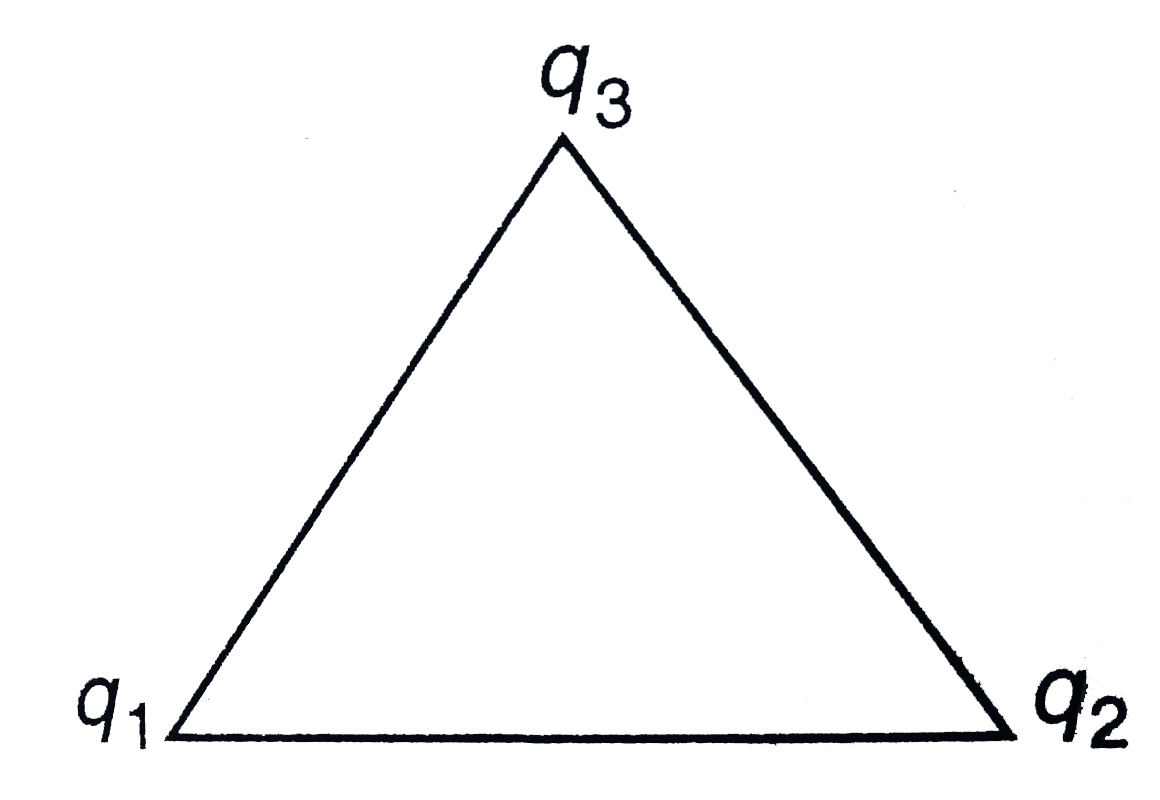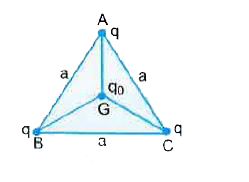Consider three charges and each equal to , at the vertices of an equilateral triangle of side l. What is the force on a charge Q placed at the centroid of the triangle?
In the given equilateral triangle ABC of sides of length l, if we draw a perpedicular AD to the side BC.
AD= and the distance AO of the entroid O from A is (2/3) AD= l. By symmartry AO=BO=CO.
by the parallelogram law. Therefore, the total force on , where is the unit vector along OA.
It is clear also by symmetry that the three forces will sum to zero. Suppose that the resultant force was non-zero but in some direction. Consider what would happen if the system was rotated through 60° about O
Topper's Solved these Questions
- ELECTRIC CHARGES AND FIELDSBOOK - NCERTCHAPTER - ELECTRIC CHARGES AND FIELDSEXERCISE - EXERCISE
34 Videos
- DUAL NATURE OF RADIATION AND MATTERBOOK - NCERTCHAPTER - DUAL NATURE OF RADIATION AND MATTEREXERCISE - Exercise
37 Videos
- ELECTROMAGNETIC INDUCTIONBOOK - NCERTCHAPTER - ELECTROMAGNETIC INDUCTIONEXERCISE - Exercise
17 Videos
Similar Questions
Consider three charges q1,q2 and q3 each equal to q at the verticles of an equilateral triangle of side 'l' what is the force on any charge due to remianing charges.
View SolutionConsider three charges q1,q2 and q3 each equal to q at the vertices of an equilateral triangle of side 'l' what is the force on any charge due to remaining charges.
View Solution
Knowledge Check
Three charges q1,q2,q3 each equal to q placed at the vertices of an equilateral triangle of side l . What will be the force on a charge Q placed at the centroid of triangle ?
A4NB5NC10NDZeroThree charge −q,+q and −q are placed at the cornors of an equilateral triangle of side a The resultant electric froce an a charge +q placed at a the centroid O of the triangle is
A3q24πε0a2Bq24πε0a2Cq22πε0a2D3q22πε0a2Three charges each of value q are placed at the corners of an equilateral triangle. A fourth charge Q is placed at the centre of the triangle. If Q=−q:
Athe charges will move towards the centreBthe charges will move away from the centreCthe charges will remain stationaryDthe charges may move in any direction
Consider the charges q,q and -q placed at the vertices of an equilateral triangle of each side l. What is the force on each charge ?
View SolutionThree charges each of 8 mu C are fixed on vertices of an equilateral triangle of side 1cm. The force on a unit test charge kept at centroid of the triangle will be
View SolutionThree charges q1=1μC,q2=2μC and q3=3μC are placed on the vertices of an equilateral triangle of side 1.0 m. Find the net electric force acting on charge q1

View SolutionThree identical charges of q each are placed at the three verticess of an equilateral triangle ABC of side a, Electrostatic force experienced by a point charge q0 situated at the centroid G of triangle is ___________

View SolutionThree charges 2q,−q,and−q are located at the vertices of an equilateral triangle. At the center of the triangle,
View Solution
